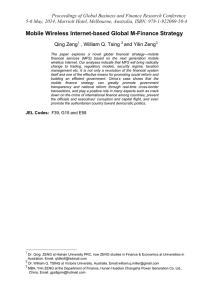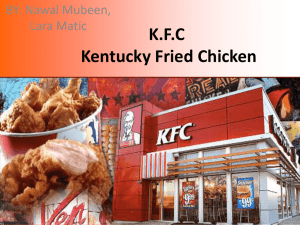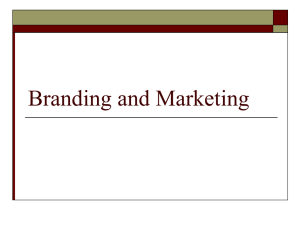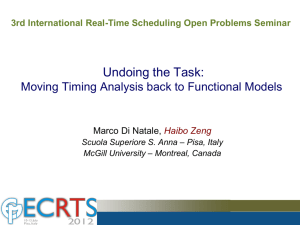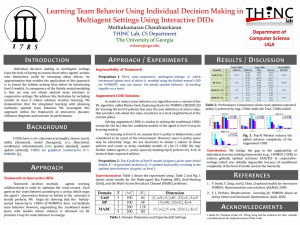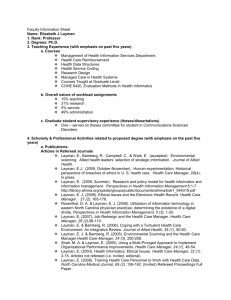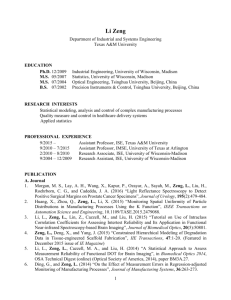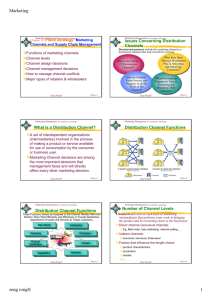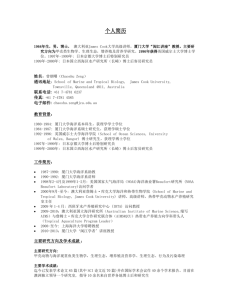The Contribution of Different Online Communities
advertisement
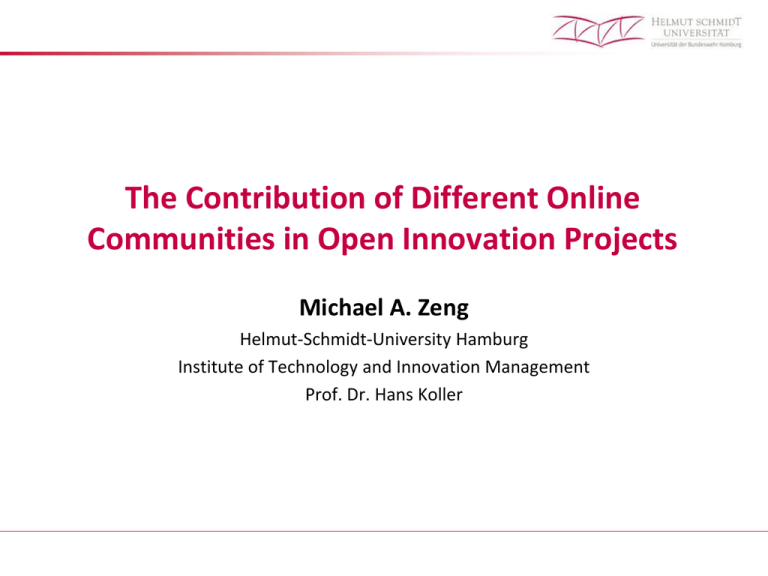
The Contribution of Different Online Communities in Open Innovation Projects Michael A. Zeng Helmut-Schmidt-University Hamburg Institute of Technology and Innovation Management Prof. Dr. Hans Koller Agenda 1. 2. 3. 4. 5. Research Questions Empirical Field Method Findings Future Research Michael A. Zeng The Contribution of Different Online Communities in Open Innovation Projects 2 July 28, 2014 Motivation Michael A. Zeng The Contribution of Different Online Communities in Open Innovation Projects 3 July 28, 2014 Research Questions How do brand communities and innovation communities differ? How could they be used best in new product development processes? Innovation community ? Idea generation Michael A. Zeng Brand community ? Screening Development ? Testing The Contribution of Different Online Communities in Open Innovation Projects Launch 4 July 28, 2014 Empirical Field Innovation community Brand community powered by Michael A. Zeng The Contribution of Different Online Communities in Open Innovation Projects 5 July 28, 2014 Method: Sample Company α β γ δ ε ζ η θ ι κ Michael A. Zeng Business area Number of employees Jewelry eight Hosiery/ legwear three Restaurant ten Restaurant two Fashion two Town planning two Cosmetic two Public bath one Distillery three Social aid programs two unserAller Project Ring; collection set Garter for Oktoberfest Wafer topping Breakfast; business lunch Belt Suggestions for donations Face care set Suggestions to renew a public bath Carnival liqueur Language application The Contribution of Different Online Communities in Open Innovation Projects 6 July 28, 2014 Method: Research design Interview guideline developed Interviews conducted Interviews transcribed using the software F5 Category system developed (qualitative content analysis (Mayring 2010)) Interviews categorized in MaxQDA Inter-rater reliability: 89% Michael A. Zeng The Contribution of Different Online Communities in Open Innovation Projects 7 July 28, 2014 Findings Brand loyalty Innovation community Brand community on crowdsourcing platform on social network Open innovation process Innovative members Idea generation Screening Development Testing Launch Marketing effect Would be best to bring the potential of both communities together in a harmonized form Michael A. Zeng The Contribution of Different Online Communities in Open Innovation Projects 8 July 28, 2014 Future Research • Does this harmonized strategy work with a larger sample? And how? • What about other fields? More complex products or processes? • Brand communities with stronger social relations than among Facebook fans? Michael A. Zeng The Contribution of Different Online Communities in Open Innovation Projects 9 July 28, 2014 Thank you! Questions? Contact Michael Zeng Helmut-Schmidt-University/ University of the Federal Armed Forces Hamburg Institute of Technology and Innovation Management Holstenhofweg 85 22043 Hamburg Germany +49 40 6541 3735 michael.zeng@hsu-hh.de Michael A. Zeng The Contribution of Different Online Communities in Open Innovation Projects 10 July 28, 2014 BACKUP Michael A. Zeng The Contribution of Different Online Communities in Open Innovation Projects 11 July 28, 2014 Findings Brand loyalty Innovation community Brand community on crowdsourcing platform on social network Open innovation process Innovative members Idea generation Screening Development Testing Launch Marketing effect Would be best to bring the potential of both communities together in a harmonized form Michael A. Zeng The Contribution of Different Online Communities in Open Innovation Projects 12 July 28, 2014 Characteristics of a BC on FB According to Loewenfeld (2006): • Non-geographical • Based on interests • offline • Admirer of the brand • Interaction • Sense of community/ corporate feeling • Connection of values and needs Michael A. Zeng and/or online The Contribution of Different Online Communities in Open Innovation Projects 13 July 28, 2014 Example Michael A. Zeng The Contribution of Different Online Communities in Open Innovation Projects 14 July 28, 2014 Example Michael A. Zeng The Contribution of Different Online Communities in Open Innovation Projects 15 July 28, 2014 References • • • • • • • • • • • Chesbrough, H. W. (2006). Open Business Models: How to Thrive in the New Innovation Landscape. Boston, MA: Harvard Business School Press. Füller, J., Matzler, K., & Hoppe, M. (2008). Brand community members as a source of innovation. Journal of Product Innovation Management, 25(6), 608–619. Janzik, L., & Raasch, C. (2011). Online communities in mature markets: Why join, why innovate, why share? International Journal of Innovation Management, 15(04), 797–836. Mayring, P. (2010). Qualitative Inhaltsanalyse: Grundlagen und Techniken (11th ed.). Weinheim: Beltz. Kim, A. J. (2000). Community Building on the Web: Includes Index. Berkeley, CA: Peachpit Press. Möslein, K. M., Reichwald, R., & Kölling, M. (2011). Open innovation in der Dienstleistungsgestaltung. WSI Mitteilungen, 64(9), 484–490. Muniz Jr., A.M., and O’Guinn, T.C. (2001). Brand Community. Journal of Consumer Research. 27, 4, 412–432. Ollila, S., & Elmquist, M. (2011). Managing open innovation: Exploring challenges at the interfaces of an open innovation arena. Creativity and Innovation Management, 20(4), 273–283. Shani, A. B., Sena, J. A., & Olin, T. (2003). Knowledge management and new product development: A study of two companies. European Journal of Innovation Management, 6(3), 137–149. Schau, H. J., Muniz Jr., A. M., & Arnould, E. J. (2009). How Brand Community Practices Create Value. Journal of Marketing(73)5, 30-51. Schroll, A., & Römer, S. (2011). Open Innovation heute: Instrumente und Erfolgsfaktoren. Zeitschrift für Information Management und Consulting, 26(1), 58–64. Michael A. Zeng The Contribution of Different Online Communities in Open Innovation Projects 16 July 28, 2014 Theoretical Background: Online Communities • Online communities: – Individuals with same interests or common goals – Discussion via an Internet platform, especially Web 2.0 (Janzik, Raasch 2011; Kim 2000) • Innovation communities: – Include Lead User characteristics and innovative skills – Ideas are collaboratively developed and discussed (Janzik, Raasch 2011; Shani, Sena, Olin 2003) • Brand communities: – Strong connection to the brand and/or the product – Can be used as innovation sources (Schau, Muniz, Arnould 2009; Janzik, Raasch 2011; Muniz, O’Guinn 2001; Füller, Matzler, Hoppe 2008) Michael A. Zeng The Contribution of Different Online Communities in Open Innovation Projects 17 July 28, 2014 Theoretical Background: Online Community Platforms • Self-designed platform – Better to control – Community is smaller (Schroll, Römer 2011) • Third party platforms: – Innovation intermediary • Helps other companies to implement open innovation into their business • Two-sided market between innovator and inventor (Schroll, Römer 2011, Chesbrough 2006; Möslein, Reichwald, Kölling 2011; Ollila, Elmquist 2011) – Social media • Low-cost possibility to connect with users • Critical mass cannot always be reached (Schroll, Römer 2011) Michael A. Zeng The Contribution of Different Online Communities in Open Innovation Projects 18 July 28, 2014 Method and Data: Interview Procedure • • • • • • • • • • Informed via email about the research project 5 interviews personally at the company 5 telephone interviews Interview guideline ensured that the obtained data was comparable Rather guided conversations, open-ended, and held in German Tape-recorded Conducted between August and September 2012 The length of an interview ranged between ten minutes and one hour with an average duration of forty minutes Audio files were transcribed with the software F5 Topics of the interview guideline: – Experiences with open innovation and unserAller – Comparison with their brand community – Influence of open innovation on their product development process Michael A. Zeng The Contribution of Different Online Communities in Open Innovation Projects 19 July 28, 2014 Method and Data: Evaluation Procedure • Evaluated with a self-developed category system, based on Mayring’s (2010) qualitative content analysis – Inductive and deductive category generation – Five categories: • • • • • • • Open innovation in general Social media/ unserAller Impact of customer integration Growth Future Interviews were coded with the software MaxQDA Inter-rater reliability with an arithmetic mean of 88.75 % Michael A. Zeng The Contribution of Different Online Communities in Open Innovation Projects 20 July 28, 2014
